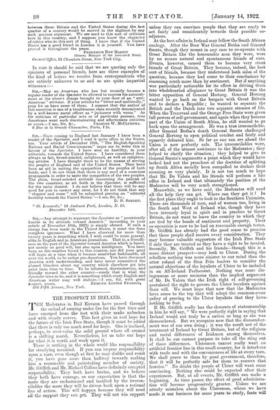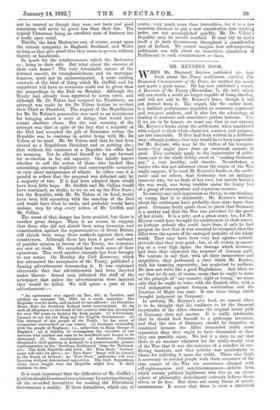THE PROSPECT IN IRELAND. T HE Moderates in Dail Eireann have
passed through the ordeal of coming under fire for the first time and have emerged from the test with their ranks unbroken and with steady nerves. This fact gives us real hope for the future of the Irish Free State, though it must be added that there is only too much need for hope. One is inclined, perhaps, to over-value the solid ground where all around is a shifting marsh. Nevertheless, let us take our hope for what it is worth and work upon it.
There is nothing in the whole world like responsibility for steadying mankind. If you can impose responsibility upon a man, even though at first he may dislike and resist it, you have gone more than halfway towards making him a reasonable and painstaking member of society. Mr. Griffith and Mr. Michael Collins have definitely accepted responsibility. They both have brains, and we believe they both have courage, so our expectation is that the more they are embarrassed and insulted by the irrecon- cilables the more they will be driven back upon a rational line of action. This will happen because they will need all the support they can get. They will not win support unless they can convince people that they are ready to act fairly and considerately towards their possible co- adjutors.
At the best-affairs in Ireland may follow the South African analogy. After the Boer War General Botha and General Smuts, though they meant in any case to co-operate with Great Britain like the honourable men they -were, were by no means natural and spontaneous friends of ours. Events, however, caused them to become very stout friends of Great Britain. They became, indeed, the best sort of friends, because they understood both sides of the question, because they had come to their conclusions by reasoning much more than- by sentiment. But if anything was particularly noticeable for its effect in driving them into wholehearted allegiance to Great Britain it was the bitter opposition of General Hertzog. General Hertzog wanted to go back on the bargain with Great Britain and to declare a Republic ; he wanted to separate the British and the Dutch into two separate streams of life. When the Transvaal and the Orange Free State were given full powers of self-government, and again when they became part of the Union of South Africa, he still wanted to go back upon the arrangement. He was a true irreconcilable. After General Botha's death General Smuts challenged General Hertzog to open political combat and fairly and squarely defeated him. So far as one can see ahead the Union is now perfectly safe. The irreconcilables -were, after all, of the utmost assistance to the Moderates ; they helped to clarify the situation ; they helped to give to General Smuts's arguments a point which they would have lacked had not the preachers of the doctrine of splitting up South Africa racially been compelled to declare their meaning so very plainly. It is not too much to hope that Mr. De Valera and his friends will perform a like office in Ireland and that ultimately the position of the Moderates will be very much strengthened. Meanwhile, as we have said, the Moderates will need all! the help they can get. Where can they get it ? In the first place they ought to look to -the Southern Unionists. There are thousands of men, and of women too, living in the South and West of Ireland --who, though they have been intensely loyal in spirit and in practice to Great Britain, do not want to leave the country to which they are tied by the bonds of sentiment and property. Their co-operation is now to be had on reasonable enough terms. Mr. Griffith has already had the good sense to promise that these people shall receive every consideration. They may become valuable supporters of the Irish Free State if only they are treated as they have a right to be treated. Secondly, Mr. Griffith and his friends—though this is a more distant prospect—may look to Ulster. During the rebellion nothing was more sinister to our mind than the utter refusal of the Sinn Fein leaders to consider the natural objections of the loyalists of Ulster' to be included in an All-Ireland Parliament. Nothing was more dis- ingenuous or more ominous than the implied argument of Mr. De Valera that the Irish right of -self-governing postulated the right to govern the Ulster loyalists against their will. We must hope that now that the Moderates have come to the top they will adopt •the common-sense policy of proving to the Ulster loyalists that they have- nothing to fear. If Mr. Griffith really has the elements of statesmanship in him he will say, " We were perfectly right in saying that Ireland would not truly be a nation so long as she was dismembered. But we recognize now that the dismember- ment was of our own doing ; it was the result not of the treatment of Ireland by Great Britain, but of the religious and racial differences of Irishmen among themselves. It shall be our earnest purpose to take all the sting out of those differences. Ulstermen want really % an artificial frontier line in this small country, for it interferes with trade and with the conveniences of.life at every turn. We shall prove to them by -good government, therefore, that it will be perfectly safe for them to remove that frontier." No doubt the people of Ulster will want some convincing. Nothing else could be, 'expected after their experiences. But, at all events, Mr. Griffith can make a beginning. As time passes the effect of -good administra- tion will become progressively greater. Unless we are utterly mistaken about the Ulstermen, • whom we have made it our business for -some years to study, facts will not be treated as though they were not facts and good intentions will never be given less than their due. The typical Ulsterman being -an excellent man of business has a really open mind.. Thirdly, the Irish Moderates can, of course, count upon the utmost sympathy in England, Scotland, and Wales so long as they give proof that they mean to govern without bigotry or fanaticism. So much for the reinforcements which the Moderates ca a bring to their side. But what about the enemies of their own house The very formidable nature of the internal enmity, its wrongheadedness, and its unscrupu- lousness, must not be underestimated. A more striking example of the kind of thing which Mr. Griffith and his supporters will have to overcome could not be given than the proceedings in the Dail on Monday. Although the Treaty had already been approved by seven votes, and although Mr. De Valera had resigned his Presidency, an attempt was made by the De Valera faction to re-elect their Chief as President. The respect of the Republicans for Mr. De Valera's personality was used as an instrument for bringing about a state of things that would have meant absolute chaos. For the real meaning of the attempt was that in spite of the fact that a majority of the Dail had accepted the gift of Dominion status, the Republic was to continue in active being with Mr. De Valera at its head. Mr. De Valera said that he had been elected as a Republican President and as nothing else ; that without. the existence of a Republic his office had no meaning. Yet he allowed himself to be put forward for re-election in his old capacity. One hardly- knows whether to call the action of those who backed this astonishing attempt duplicity and contemptible casuistry or only sheer inexperience of affairs. In either case it is painful to reflect that the proposal was defeated only by a majority-of two: If it had been adopted there would have been little hope. Mr. Griffith and Mr. Collins would have continued, no doubt, to try to set up the Free State ; but the Republic, with Mi. De Valera at its head, would have been still operating with the sanction of the Dail and would have tried to undo, and probably would have. undone, step by step every action of Mr. Griffith and Mr. Collins.
The worst of that danger has been avoided, but there is another great danger. There is no reason to suppose that those who did not shrink from using terrorism and assassination against the representatives of. Great Britain will shrink from using these methods against their own countrymen. Although there has been a great outburst of popular opinion in favour of the Treaty, the terrorists are now at work. We recorded last week some of their operations. This week another example has been brought to our notice. On Monday the Cork Examiner, which has advocated the acceptance of the Treaty, published a flaming advertisement denouncing it. It' was explained afterwards that this advertisement had been inserted under threats. Armed men informed the staff of the newspaper that unless the advertisement were inserted. they would be killed. We will quote a part of the advertisement :— " An agreement was signed on Dec. 6th in London, and ratified on January 7th, 1922, by a small majority. The. Republic was let down, and instead we are offered : (a) Dominion Home Rule for Southern Ireland (with reservations). (b) An oath of allegiance- to the head' of the country that has attempted for over 700 years to destroy the Irish. people. (c) A Governor- General to act for the King, and the English Government. (d) The betrayal of the people of the North. (e) An. army of occupation entrenched on our coasts.. (D Common citizenship with the people of England ; i.e., subjection to King George of England. (g) A liability to recompense the servants of our enemies who marked out men to be murdered and homes to be destroyed. (h) The establishment of Southern Unionists (England's chief garrison in Ireland) to a proportionally greater representation in the ' Southern Parliament ' than the National- ists. The Irish Republic still lives. No ' Free State ' Govern- ment will take its place.; no Free State ' Army will be formed in the South of Ireland ; no ' Free State ' judiciaries will ever function without determined opposition. The Irish Republican Army have fought that the Republic might live. It shall continue to live."
It is most important that the difficulties of Mr. Griffith's position should be reduced to a minimum by carrying through all the so-called formalities for making the Provisional Government a reality. If these formalities, which are, of course, very much more than formalities, for it is a tre. mendous -business to put a new constitution into working order,- are not accomplished quickly; Mr. De Valera's Republic may do untold mischief. It may try to maks itself a de facto Government throughout a considerable part of Ireland. We cannot imagine how self-respecting politicians can talk about an immediate dissolution of Parliament in such circumstances as these.



































 Previous page
Previous page